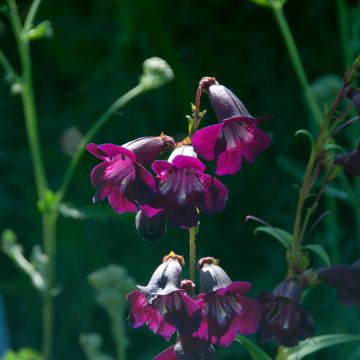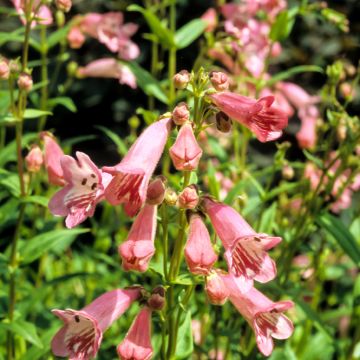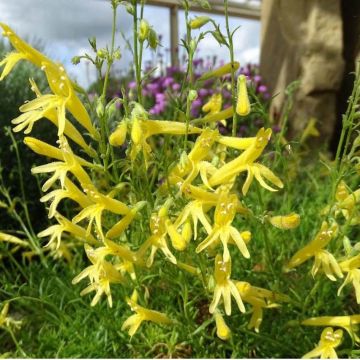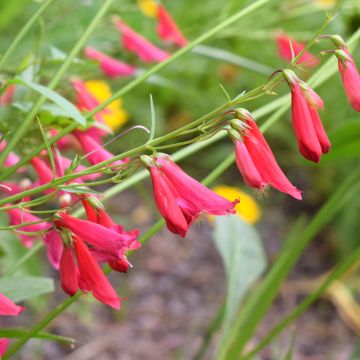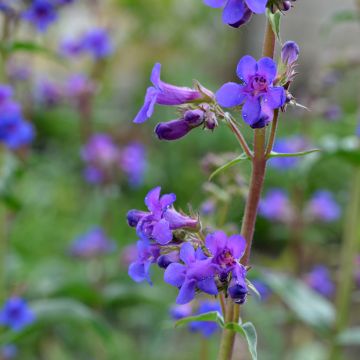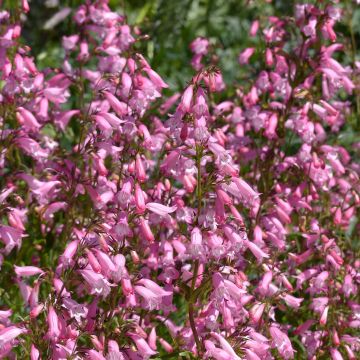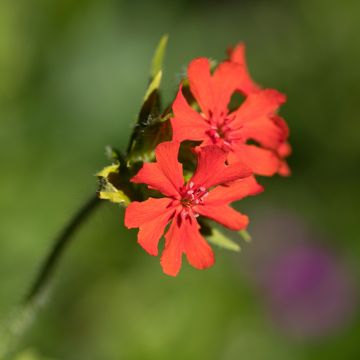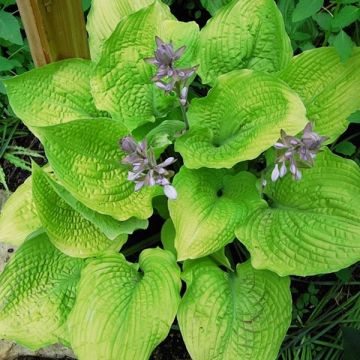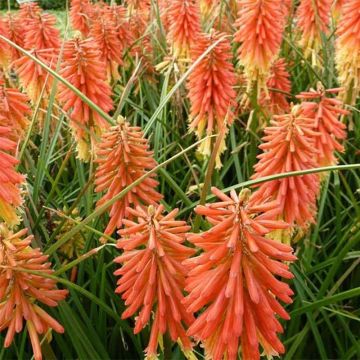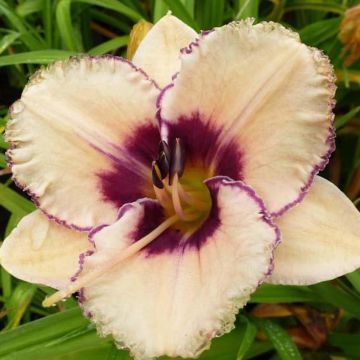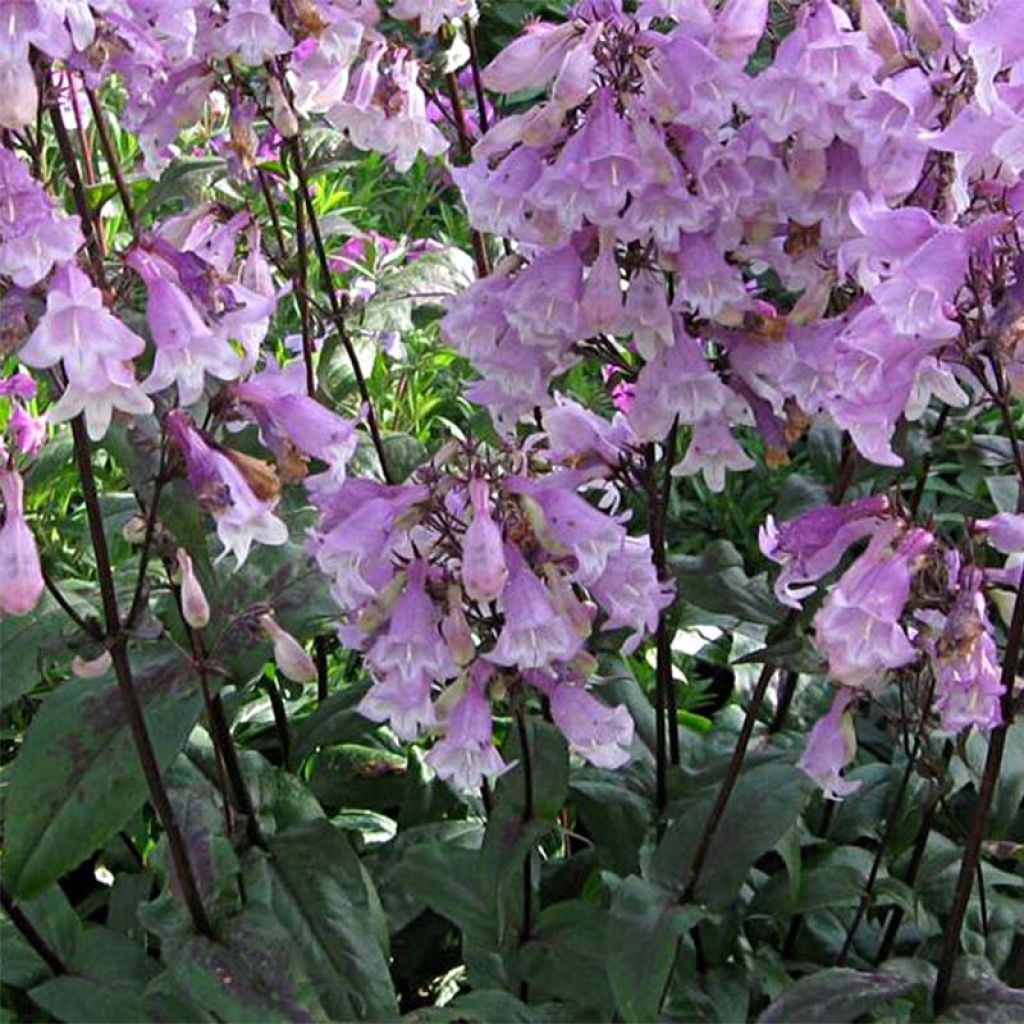

Penstemon digitalis Pocahontas - Foxglove beardtongue
Penstemon digitalis Pocahontas - Foxglove beardtongue
Penstemon digitalis Pocahontas
Foxglove Beardtongue, Smooth White Beardtongue
This item cannot be shipped to the selected country
Delivery charge from €5.90
More information
Schedule delivery date,
and select date in basket
This plant carries a 12 months recovery warranty
More information
We guarantee the quality of our plants for a full growing cycle, and will replace at our expense any plant that fails to recover under normal climatic and planting conditions.
From €5.90 for pickup delivery and €6.90 for home delivery
Express home delivery from €8.90.

Does this plant fit my garden?
Set up your Plantfit profile →
Description
The Penstemon digitalis 'Pocahontas' is a beautiful improvement on older cultivars with purplish foliage, such as 'Husker Red' or 'Pink Dawn'. This Penstemon is an exceptional variety because of its foliage, which is strongly tinted with purple for much of the season, and its impressive stature. On this beautiful and richly coloured bushy vegetation, numerous campanulate flowers bloom in June-July with a lovely lavender-pink colour, arranged in abundant clusters on stems of a deep burgundy red. Invite it into a large flower bed or even among your favourite bushes: this Penstemon has a strong personality and is elegant and charming!
Penstemon digitalis belongs to the Scrophulariaceae family, just like the foxglove, whose flowers are similar. The 'digitalis' Penstemon is native to North America. It is mainly found in the eastern and southeastern United States, growing in dry areas such as meadows or open forests on well-drained, loamy or sandy soil. The hybrid variety 'Pocahontas', recently introduced in the USA, results from cross-breeding between a variety of Penstemon digitalis with dark red foliage and the compact cultivar 'Pink Dawn' with dark pink flowers.
The 'Pocahontas' Penstemon grows from a robust base, forming a basal rosette of large deciduous leaves measuring up to 20 cm (8in) in length and 6 cm (2in) in width. They are a shiny purple-green on the upper side and a wine-red on the underside. In June, thick and hairy stems rise to a burgundy-red colour, reaching a diameter of up to 8 mm (0in) and a height of 90 cm (35in). They are adorned with smaller leaves, dark purple, which become slightly greener over time. At their tips, tubular flowers with five lobes bloom on numerous branches, each measuring about 25 mm (1in) in length and 14 mm (1in) in width. They are grouped in pairs on beautiful clusters measuring 15 cm (6in) in length. Each cluster or panicle can have up to 80 flowers, totalling 3000 flowers per plant. Their colour is a pastel mauve-pink. This variety is hardy in healthy soil.
The 'Pocahontas' Penstemon deserves a prime location: in a bed of perennials or sun-loving bushes, it stands out in June. It can be planted with old roses (Salet, Yolande d'Aragon) or English roses (Heritage, Brother Cadfael) and with deutzias. But also, in a more minimalist style, with beautiful blue grasses like oats or the Schizachyrium scoparium Prairie Blues, or with nicely coloured Panicum Shenandoah or Cheyenne Sky. It will blend with not-too-tall ceanothus, rosemary, cotton lavenders, rockroses, or wormwoods. It also performs very well in pots, with proper drainage and regular fertiliser. Penstemons also make excellent cut flowers.
Report an error about the product description
Penstemon digitalis Pocahontas - Foxglove beardtongue in pictures
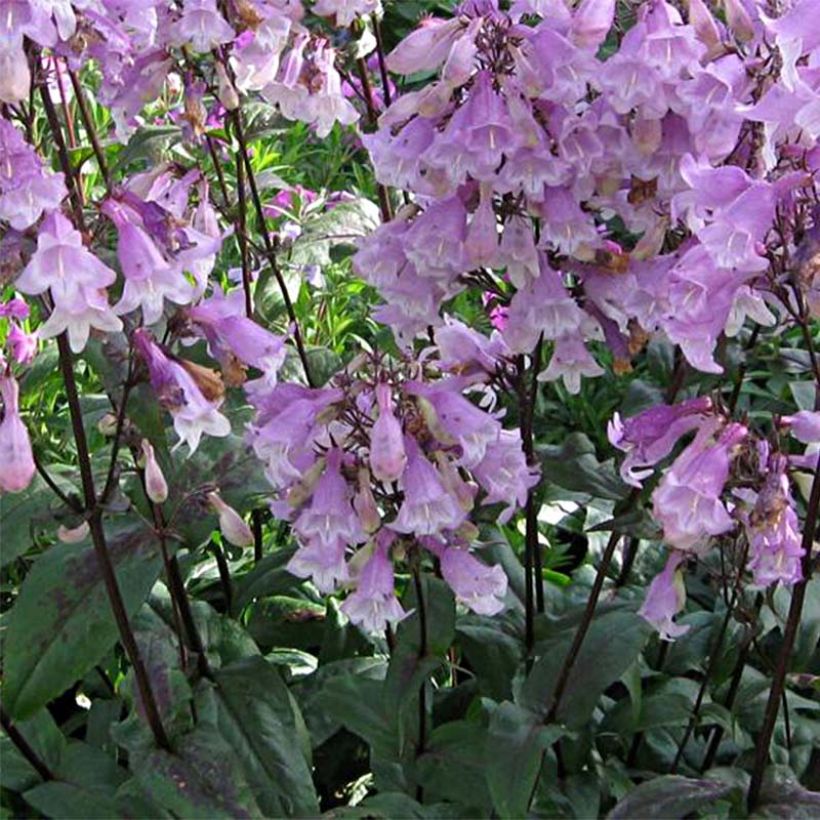

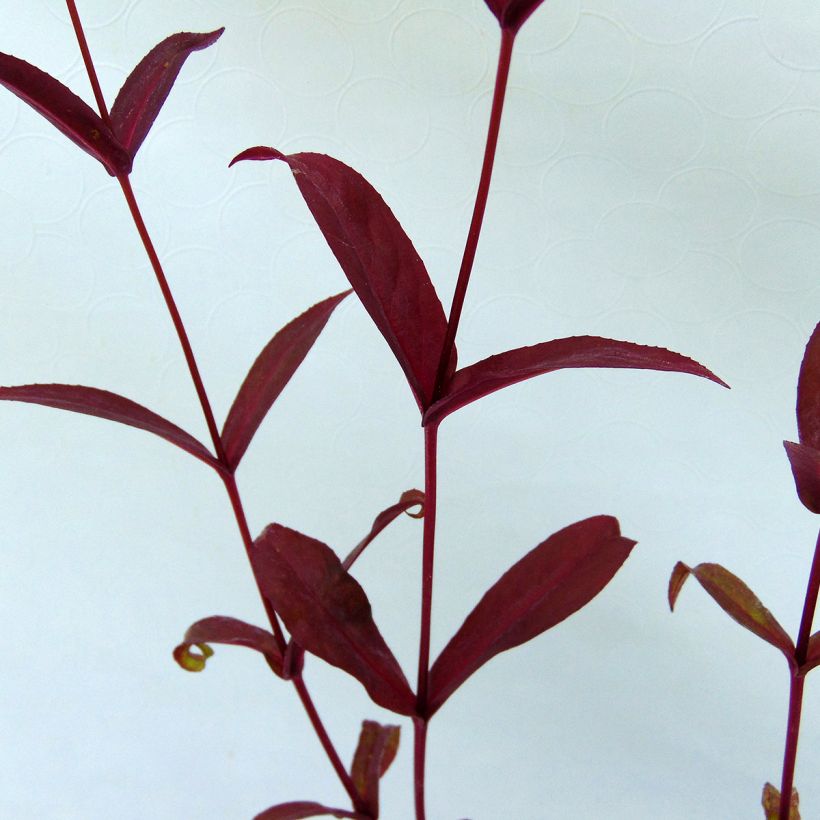

Flowering
Foliage
Plant habit
Botanical data
Penstemon
digitalis
Pocahontas
Scrophulariaceae
Foxglove Beardtongue, Smooth White Beardtongue
Cultivar or hybrid
Other Penstemon
Planting and care
The Penstemon digitalis 'Pocahontas' grows best in sunny locations or partially shaded areas in very sunny climates. It needs well-drained soil that is light, rich, and can be either dry or moist. The plant can tolerate slightly acidic soil and some limestone. It is easy to grow but needs attention as it doesn't tolerate winter moisture. The plant is fairly hardy and can withstand temperatures as low as -12°C (10.4°F). In order to regulate soil moisture, it's best not to cut back the clump at the end of the season. To prevent rotting of the collar caused by excess moisture, use mulch at the beginning of winter, such as a layer of dead leaves, sand and crushed gravel to improve drainage. Plant the Penstemon in either autumn or spring and fertilise lightly at installation, but avoid fertilising afterwards as this may result in weak stems. Penstemons generally resist diseases, but can still be subject to powdery mildew, downy mildew, snails, slugs, and chrysanthemum nematodes.
Planting period
Intended location
Care
-
, onOrder confirmed
Reply from on Promesse de fleurs
Summer flowering perennials
Haven't found what you were looking for?
Hardiness is the lowest winter temperature a plant can endure without suffering serious damage or even dying. However, hardiness is affected by location (a sheltered area, such as a patio), protection (winter cover) and soil type (hardiness is improved by well-drained soil).

Photo Sharing Terms & Conditions
In order to encourage gardeners to interact and share their experiences, Promesse de fleurs offers various media enabling content to be uploaded onto its Site - in particular via the ‘Photo sharing’ module.
The User agrees to refrain from:
- Posting any content that is illegal, prejudicial, insulting, racist, inciteful to hatred, revisionist, contrary to public decency, that infringes on privacy or on the privacy rights of third parties, in particular the publicity rights of persons and goods, intellectual property rights, or the right to privacy.
- Submitting content on behalf of a third party;
- Impersonate the identity of a third party and/or publish any personal information about a third party;
In general, the User undertakes to refrain from any unethical behaviour.
All Content (in particular text, comments, files, images, photos, videos, creative works, etc.), which may be subject to property or intellectual property rights, image or other private rights, shall remain the property of the User, subject to the limited rights granted by the terms of the licence granted by Promesse de fleurs as stated below. Users are at liberty to publish or not to publish such Content on the Site, notably via the ‘Photo Sharing’ facility, and accept that this Content shall be made public and freely accessible, notably on the Internet.
Users further acknowledge, undertake to have ,and guarantee that they hold all necessary rights and permissions to publish such material on the Site, in particular with regard to the legislation in force pertaining to any privacy, property, intellectual property, image, or contractual rights, or rights of any other nature. By publishing such Content on the Site, Users acknowledge accepting full liability as publishers of the Content within the meaning of the law, and grant Promesse de fleurs, free of charge, an inclusive, worldwide licence for the said Content for the entire duration of its publication, including all reproduction, representation, up/downloading, displaying, performing, transmission, and storage rights.
Users also grant permission for their name to be linked to the Content and accept that this link may not always be made available.
By engaging in posting material, Users consent to their Content becoming automatically accessible on the Internet, in particular on other sites and/or blogs and/or web pages of the Promesse de fleurs site, including in particular social pages and the Promesse de fleurs catalogue.
Users may secure the removal of entrusted content free of charge by issuing a simple request via our contact form.
The flowering period indicated on our website applies to countries and regions located in USDA zone 8 (France, the United Kingdom, Ireland, the Netherlands, etc.)
It will vary according to where you live:
- In zones 9 to 10 (Italy, Spain, Greece, etc.), flowering will occur about 2 to 4 weeks earlier.
- In zones 6 to 7 (Germany, Poland, Slovenia, and lower mountainous regions), flowering will be delayed by 2 to 3 weeks.
- In zone 5 (Central Europe, Scandinavia), blooming will be delayed by 3 to 5 weeks.
In temperate climates, pruning of spring-flowering shrubs (forsythia, spireas, etc.) should be done just after flowering.
Pruning of summer-flowering shrubs (Indian Lilac, Perovskia, etc.) can be done in winter or spring.
In cold regions as well as with frost-sensitive plants, avoid pruning too early when severe frosts may still occur.
The planting period indicated on our website applies to countries and regions located in USDA zone 8 (France, United Kingdom, Ireland, Netherlands).
It will vary according to where you live:
- In Mediterranean zones (Marseille, Madrid, Milan, etc.), autumn and winter are the best planting periods.
- In continental zones (Strasbourg, Munich, Vienna, etc.), delay planting by 2 to 3 weeks in spring and bring it forward by 2 to 4 weeks in autumn.
- In mountainous regions (the Alps, Pyrenees, Carpathians, etc.), it is best to plant in late spring (May-June) or late summer (August-September).
The harvesting period indicated on our website applies to countries and regions in USDA zone 8 (France, England, Ireland, the Netherlands).
In colder areas (Scandinavia, Poland, Austria...) fruit and vegetable harvests are likely to be delayed by 3-4 weeks.
In warmer areas (Italy, Spain, Greece, etc.), harvesting will probably take place earlier, depending on weather conditions.
The sowing periods indicated on our website apply to countries and regions within USDA Zone 8 (France, UK, Ireland, Netherlands).
In colder areas (Scandinavia, Poland, Austria...), delay any outdoor sowing by 3-4 weeks, or sow under glass.
In warmer climes (Italy, Spain, Greece, etc.), bring outdoor sowing forward by a few weeks.

































